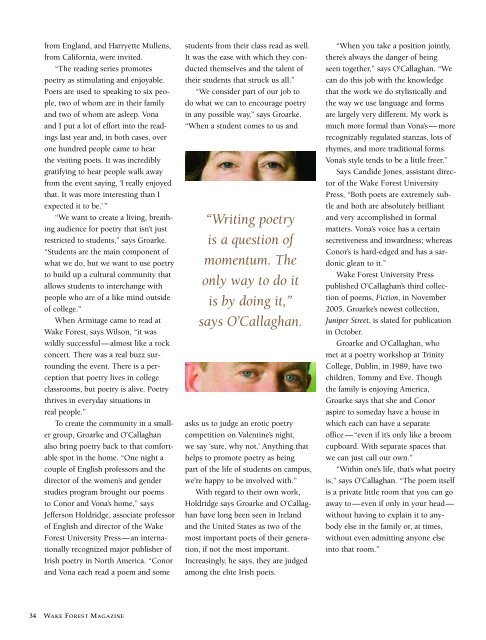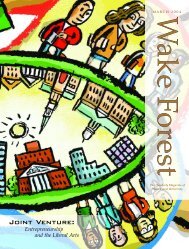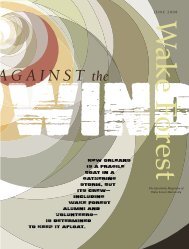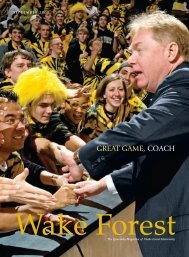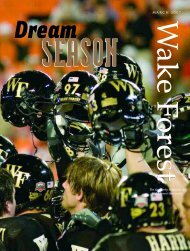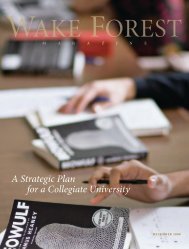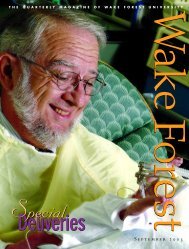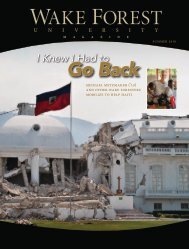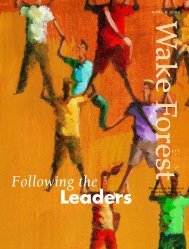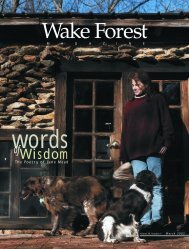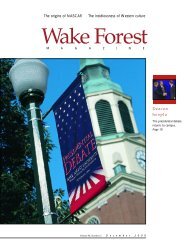Covers Contents - Past Issues - Wake Forest University
Covers Contents - Past Issues - Wake Forest University
Covers Contents - Past Issues - Wake Forest University
- No tags were found...
Create successful ePaper yourself
Turn your PDF publications into a flip-book with our unique Google optimized e-Paper software.
from England, and Harryette Mullens,from California, were invited.“The reading series promotespoetry as stimulating and enjoyable.Poets are used to speaking to six people,two of whom are in their familyand two of whom are asleep. Vonaand I put a lot of effort into the readingslast year and, in both cases, overone hundred people came to hearthe visiting poets. It was incrediblygratifying to hear people walk awayfrom the event saying, ‘I really enjoyedthat. It was more interesting than Iexpected it to be.’ ”“We want to create a living, breathingaudience for poetry that isn’t justrestricted to students,” says Groarke.“Students are the main component ofwhat we do, but we want to use poetryto build up a cultural community thatallows students to interchange withpeople who are of a like mind outsideof college.”When Armitage came to read at<strong>Wake</strong> <strong>Forest</strong>, says Wilson, “it waswildly successful—almost like a rockconcert. There was a real buzz surroundingthe event. There is a perceptionthat poetry lives in collegeclassrooms, but poetry is alive. Poetrythrives in everyday situations inreal people.”To create the community in a smallergroup, Groarke and O’Callaghanalso bring poetry back to that comfortablespot in the home. “One night acouple of English professors and thedirector of the women’s and genderstudies program brought our poemsto Conor and Vona’s home,” saysJefferson Holdridge, associate professorof English and director of the <strong>Wake</strong><strong>Forest</strong> <strong>University</strong> Press—an internationallyrecognized major publisher ofIrish poetry in North America. “Conorand Vona each read a poem and somestudents from their class read as well.It was the ease with which they conductedthemselves and the talent oftheir students that struck us all.”“We consider part of our job todo what we can to encourage poetryin any possible way,” says Groarke.“When a student comes to us and“Writing poetryis a question ofmomentum. Theonly way to do itis by doing it,”says O’Callaghan.asks us to judge an erotic poetrycompetition on Valentine’s night,we say ‘sure, why not.’ Anything thathelps to promote poetry as beingpart of the life of students on campus,we’re happy to be involved with.”With regard to their own work,Holdridge says Groarke and O’Callaghanhave long been seen in Irelandand the United States as two of themost important poets of their generation,if not the most important.Increasingly, he says, they are judgedamong the elite Irish poets.“When you take a position jointly,there’s always the danger of beingseen together,” says O’Callaghan. “Wecan do this job with the knowledgethat the work we do stylistically andthe way we use language and formsare largely very different. My work ismuch more formal than Vona’s — morerecognizably regulated stanzas, lots ofrhymes, and more traditional forms.Vona’s style tends to be a little freer.”Says Candide Jones, assistant directorof the <strong>Wake</strong> <strong>Forest</strong> <strong>University</strong>Press, “Both poets are extremely subtleand both are absolutely brilliantand very accomplished in formalmatters. Vona’s voice has a certainsecretiveness and inwardness; whereasConor’s is hard-edged and has a sardonicglean to it.”<strong>Wake</strong> <strong>Forest</strong> <strong>University</strong> Presspublished O’Callaghan’s third collectionof poems, Fiction, in November2005. Groarke’s newest collection,Juniper Street, is slated for publicationin October.Groarke and O’Callaghan, whomet at a poetry workshop at TrinityCollege, Dublin, in 1989, have twochildren, Tommy and Eve. Thoughthe family is enjoying America,Groarke says that she and Conoraspire to someday have a house inwhich each can have a separateoffice —“even if it’s only like a broomcupboard. With separate spaces thatwe can just call our own.”“Within one’s life, that’s what poetryis,” says O’Callaghan. “The poem itselfis a private little room that you can goaway to—even if only in your head—without having to explain it to anybodyelse in the family or, at times,without even admitting anyone elseinto that room.”34 WAKE FOREST MAGAZINE


